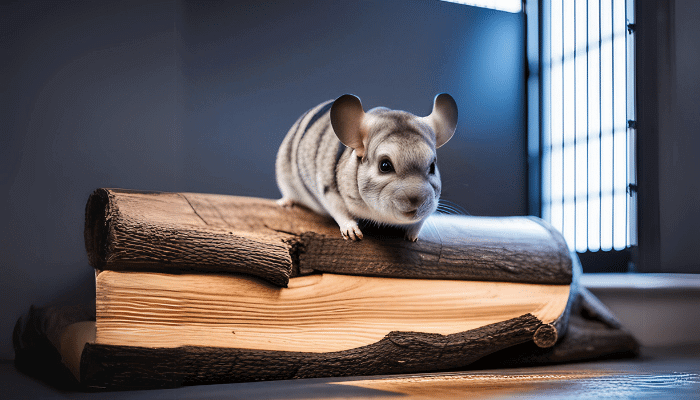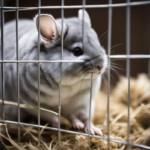Chinchillas, with their velvety fur and playful personalities, has captured the hearts of animal lovers worldwide. But beyond their undeniable cuteness lies a complex web of Chinchilla Legal and Ethical Issues. Before welcoming a chinchilla into your life, it’s crucial to understand the legal landscape, ethical considerations, and responsible ownership practices surrounding these delicate creatures.
Understanding Chinchilla Legalities

Is It Legal to Own a Chinchilla?
Owning a chinchilla is legal in many places, but regulations can vary. Check your local laws and ensure compliance with permits or licenses required. Be aware that regulations might cover issues like importation, breeding, or ownership limits.
Chinchillas and Zoning Laws
Before bringing a chinchilla into your home, investigate local zoning laws. Some areas have restrictions on certain exotic pets, including chinchillas. It’s crucial to avoid legal troubles and potential removal of your furry friend.
Chinchilla Trade Regulations
The trade of chinchillas is subject to regulations to prevent illegal trafficking and protect these creatures. Familiarize yourself with local and international regulations, especially if you’re considering breeding or selling chinchillas.
Travel Restrictions
Taking your chinchilla on vacation or across state lines might require additional health certificates and permits. Plan to ensure smooth travels with your furry companion.
Exotic Pet Laws
Chinchillas are considered exotic pets in some regions. Familiarize yourself with the exotic pet laws in your area, as non-compliance may lead to penalties or even the removal of your beloved fluffball.

Owning a chinchilla is legal in most countries, but regulations vary significantly. Here’s a glimpse into the legal landscape:
United States: No federal laws specifically regulate chinchilla ownership. However, individual states may have laws concerning exotic animal possession permits, breeding restrictions, and welfare standards.
Canada: Similar to the US, ownership laws vary by province. Alberta, for instance, requires permits for breeding, while Ontario prohibits chinchilla ownership altogether.
United Kingdom: Owning chinchillas is legal in the UK, but the Animal Welfare Act 2006 dictates proper care and welfare standards.
Australia: Chinchillas fall under the category of “controlled exotic animals” in some Australian states, requiring permits and adhering to strict breeding regulations.
Ethical Dilemmas in Chinchilla Care

Beyond legality, ethical considerations play a pivotal role in chinchilla ownership. Let’s explore the moral compass that guides responsible chinchilla guardians.
Chinchilla Habitat Ethics
Creating an ethical habitat for your chinchilla involves more than just a cage. Consider the size, the presence of toys, and the overall environment. Adequate space is essential for their well-being, as chinchillas are active creatures that need room to roam.
Chinchilla Diet and Nutrition Ethics
Feeding your chinchilla a balanced diet is not just a choice it’s a responsibility. Ethical chinchilla care involves providing a variety of hay, pellets, and occasional treats while strictly avoiding harmful foods like chocolate.

Breeding Ethics
While breeding chinchillas can be rewarding, it comes with ethical considerations. Overbreeding can lead to health issues and a surplus of unwanted chinchillas. Responsible breeding involves thorough research, commitment, and ensuring proper care for the offspring.
Environmental Enrichment
Chinchillas thrive in mentally stimulating environments. Ethical chinchilla care involves providing ample opportunities for physical activity, mental stimulation, and socialization.
Adoption vs. Purchase
Choosing to adopt a chinchilla from a rescue organization rather than purchasing from a breeder can be an ethical choice. Consider the ethical implications of supporting responsible breeding practices and contributing to the well-being of chinchillas in need.
Chinchilla Health Concerns

Respiratory Issues: Chinchillas are prone to respiratory problems due to their sensitive lungs. Dusty environments or exposure to irritants can trigger breathing difficulties. Maintain a clean and dust-free environment for your chinchilla.
Digestive Issues: Sudden dietary changes or improper food can lead to digestive upset in chinchillas. Introduce new foods gradually and stick to a high-quality chinchilla pellet diet.
Dental Issues: Chinchilla’s teeth grow continuously, and overgrown teeth can cause pain and difficulty eating. Provide gnawing toys and schedule regular dental checkups with a veterinarian experienced in exotic pets.
Conclusion
Owning a chinchilla can be a rewarding experience, but it’s crucial to make an informed decision before welcoming these delicate creatures into your life. Carefully consider the legal requirements, ethical considerations, and health needs associated with chinchilla ownership.
By prioritizing their well-being and providing them with a loving and responsible home, you can ensure a happy and fulfilling life for your furry friend.
Remember, Chinchilla Legal and Ethical Issues aren’t something to take lightly. Do your research, prioritize responsible ownership, and let your love for these fascinating creatures guide your decisions. With dedication and understanding, you can create a harmonious bond with your chinchilla and navigate the complexities of exotic pet ownership with confidence.
FAQs

Are chinchillas legal pets everywhere?
Legality varies, and some regions may have restrictions or require permits for chinchilla ownership. Research local laws to ensure compliance.
Can I breed chinchillas for profit?
While legal, ethical breeding practices should prioritize the health and well-being of the animals over financial gains.
Do I Need a License to Own a Chinchilla?
While not all regions require a license, some do. It’s crucial to research and comply with local regulations to avoid legal complications.
Is Chinchilla Fur Trade Legal?
The Chinchilla fur trade is subject to regulations. Responsible consumers must be aware of the legal status and ethical implications of purchasing chinchilla products.
Are There Specific Diets for Chinchillas?
Yes, chinchillas require a specific diet to maintain their health. A balanced mix of hay, pellets, and occasional treats is crucial. Avoid giving them foods harmful to their well-being.
How Can I Ensure My Chinchilla’s Habitat Is Ethical?
An ethical chinchilla habitat involves providing ample space, stimulating toys, and proper ventilation. Regularly clean the cage and ensure a safe, comfortable environment for your furry friend.
How much does it cost to care for a chinchilla?
Chinchilla care costs vary depending on factors like food, veterinary care, and cage accessories. Expect to spend at least $50-$100 per month on basic needs.










